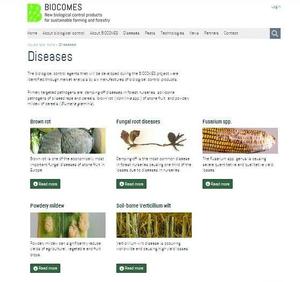Europe
May 12, 2014

Farmers and foresters have the prospect of at least 11 new biological control products to call on in the coming years, with the European BIOCOMES project bringing together 27 business and research partners from 14 different countries to produce alternative means of controlling some of the most significant diseases and pests.
Following a market analysis by six biological control product manufacturers, 11 BIOCOMES products have been selected for development. They are designed to combat diseases such as powdery mildew in cereals, brown rot in stone fruit and Fusarium-related diseases in maize, and major insect pests such as aphids in fruit tree crops, cabbage moths (Mamestra brassicae) and tomato leaf miners (Tuta absoluta) , the latter being a major pest in Mediterranean growing areas.
ENDURE particpants Per Kudsk (Aarhus University, Denmark) and Marco Barzman (INRA, France) alongside Monica Höfte, from Belgium's Ghent University, participated in the project's kick-off meeting as members of the External Advisory Board and the project is backed by a particularly easy-to-use and informative website. Browsers can easily find detailed information on the diseases and pests being targeted, in addition to an explanation of the theory and practice of biological control.
The project notes: “The replacement of chemical control by biological alternatives is an increasingly important topic for farmers and foresters in Europe. EU regulations and the resulting National Action Plans in the European countries are restricting the use of chemical control. Moreover, the maximum residue limits (MRL) applied by legislation are increasingly strict and, the demand for even lower residues from buyers in the food industry is growing. Last but not least, there is a risk of plant pathogens developing resistance to chemical control products. Biological control is therefore a useful and necessary part of growers’ crop protection programmes.”
In addition to the BIOCOMES products, which will be available or close to market by the project's closing date of November, 2017, the project is also developing two new techniques. These are the in vitro production of entomopathogenic viruses, an innovative technique aimed at achieving more economic production, and improvements to the downstream-technology and shelf life for entomopathogenic nematodes.

BIOCOMES, which is an acronym for 'Biological control manufacturers in Europe develop novel biological control products to support the implementation of Integrated Pest Management in agriculture and forestry', is being backed with around €9 million of European Union funding and has a total budget of around €12m. The coordinator is Dr. Jürgen Köhl (pictured) from Wageningen UR in the Netherlands.